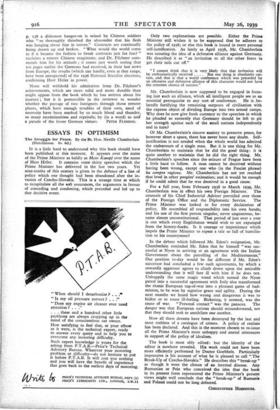ESSAYS IN OPTIMISM
The Struggle for Peace. By the Rt. Hon. Neville Chamberlain (Hutchinson. 8s. 6d.) IT is a little hard to understand why this book should have been published at this moment. It appears over the name of the Prime Minister as baldly as Mein Kampf over the name of Herr Hitler. It contains some thirty speeches which the Prime Minister has delivered in the last two years. Yet nine-tenths of this oratory is given to the defence of a line of policy which one thought had been abandoned after the in- vasion of Czecho-Slovakia. This is a strange time at which to recapitulate all the soft assurances, the arguments in favour of conceding and condoning, which preceded and led up to that decisive event.
Only two explanations are possible. Either the Prime Minister still wishes it to be supposed that he adheres to the policy of 1938; or else this book is issued in mere personal self-justification. As lately as April 1938, Mr. Chamberlain was scouting the idea of a defensive alliance against Germany. He described it as "an invitation to all the other foxes to get their tails cut off."
"I cannot think that it is very likely that that invitation will be enthusiastically received .. . . But one thing is absolutely cer- tain, and that is that a world conference which was preceded by an offensive and defensive alliance of this character would not have the remotest chance of success."
Mr. Chamberlain is now supposed to be engaged in form- ing just such an alliance, which all intelligent people see as an essential prerequisite to any sort of conference. He is be- latedly fortifying the remaining outposts of civilisation with the express object of dividing Europe into two armed camps.
Why does he now give fresh currency to the speeches in which he pleaded so earnestly that Germany should be left to pit her strength against each of the small nations independently and in turn?
Of Mr. Chamberlain's sincere anxiety to preserve peace, for however short a space, there has never been any doubt. Self- justification is not needed when the whole world has admired the endeavours of a single man. But it is one thing for Mr. Chamberlain to maintain that he did the good thing: it is
quite another to maintain that he did the right thing. Mr. Chamberlain's speeches since the seizure of Prague have been a little hard to follow. A man cannot be deceived without
having been wrong, except one who (in the Fascist phrase)
ha sempre ragione. Mr. Chamberlain has not yet reached that level in other peoples' estimation; and it would be enough
if he could admit that he was deceived in a good cause.
For a full year, from February 1938 to March 1939, Mr. Chamberlain was in effect his own Foreign Minister. The counsels of his Chief Industrial Adviser prevailed over those of the Foreign Office and the Diplomatic Service. The Prime Minister was looked to for every declaration of policy. He assembled all responsibility into his own hands; and his use of the first person singular, never ungenerous, be- came almost unconstitutional. That period of just over a year is one which every Englishman would wish to see expunged from the history-books. Is it courage or impenitence which impels the Prime Minister to repeat a tale so full of humilia- tion to his countrymen?
In the debate which followed Mr. Eden's resignation, Mr. Chamberlain reminded Mr. Eden that he himself "was suc- cessful at Nyon in arriving at an agreement with the Italian Government about the patrolling of the Mediterranean." Our position to-day would be far different if Mr. Eden's successor had concluded a few such agreements, by which a cowardly aggressor agrees to climb down upon the amicable understanding that it will fare ill with him if he does not. Unhappily the same magic wand which turned the Nyon patrol into a successful agreement with Italy also transformed the titanic European tug-of-war into a pleasant game of bad- minton, to be won by superior grace and agility. During the next months we heard how wrong and dangerous it was to bicker or to rouse ill-feeling. Bickering, it seemed, was the cause of war. "Personal contact" was the panacea. The danger was that European nations should misunderstand, not that they should seek to annihilate one another.
Now all these dreams have been destroyed by the last and most ruthless of a catalogue of crimes. A policy of realism has been declared. And this is the moment chosen to re-issue all the Prime Minister's most unhappy and unreal utterances in support of the policy of idealism.
The book is most ably edited: but the identity of the editor is nowhere revealed. His work could not have been more efficiently performed by Doctor Goebbels. Particularly impressive is his account of what he is pleased to call "The Break-Up of Czecho-Slovakia." He describes this " break:.up " as though it were the climax of an internal disease. Any Rumanian or Pole who conceived the idea that the book in its present form represented the Prime Minister's present views might well conclude that the " break-up " of Rumania and Poland could not be long deferred.
CHRISTOPHER HOBHOUSE.


























































 Previous page
Previous page